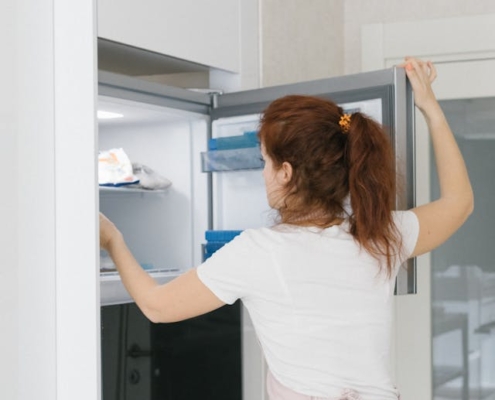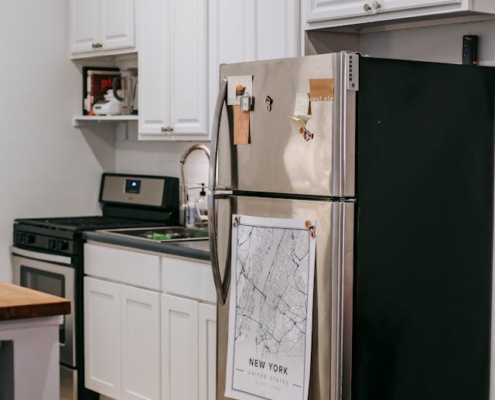Tips and Tricks for Keeping Your Freezer Efficient
 A well-maintained freezer is key to keeping your food fresh and your energy bills low. Efficient freezer operation not only ensures your food stays fresh for longer but also significantly cuts down on energy usage, translating into lower utility bills and a reduced carbon footprint. By investing a little time in upkeep, you extend your freezer’s lifespan, reducing the likelihood of costly repairs or replacements.
A well-maintained freezer is key to keeping your food fresh and your energy bills low. Efficient freezer operation not only ensures your food stays fresh for longer but also significantly cuts down on energy usage, translating into lower utility bills and a reduced carbon footprint. By investing a little time in upkeep, you extend your freezer’s lifespan, reducing the likelihood of costly repairs or replacements.
This article will help you keep your freezer in peak condition. Dive in to discover how small changes in maintenance routines can lead to big savings and long-term reliability.
Jump to article sections:
- Understanding the Basics of Freezer Efficiency
- Regular Cleaning: The First Step to Efficiency
- Optimal Temperature Settings for Energy Savings
- The Importance of Defrosting Your Freezer
- Checking and Replacing Door Seals
- Organizing Your Freezer for Better Airflow
- Monitoring and Adjusting the Thermostat
- Identifying and Fixing Common Freezer Issues
- The Role of Ventilation in Freezer Efficiency
- Energy-Efficient Practices for Daily Use
- Understanding When to Call a Professional
1. Understanding the Basics of Freezer Efficiency
To start, it’s essential to grasp how your freezer operates. Freezers work by removing heat from their interiors, and their efficiency is determined by how well they can maintain cold temperatures with minimal energy use. When your freezer is efficient, it performs better and keeps your food at optimal conditions, reducing waste and energy consumption.
2. Regular Cleaning: The First Step to Efficiency
Cleaning your freezer regularly is crucial:
- Begin by unplugging the freezer to ensure safety during the cleaning process.
- Remove all items from the freezer and store them temporarily in a cooler to keep them cold.
- Use a mixture of mild detergent and warm water to clean the interior surfaces, avoiding harsh chemicals that might damage the appliance.
- Pay special attention to the door seals and hinges, as grime and residue can accumulate and affect the freezer’s efficiency.
- Wipe down the exterior of the freezer as well, ensuring it’s free from dust and debris.
- After cleaning, dry all surfaces thoroughly with a towel before plugging the freezer back in.
- Organize the contents neatly when returning them to the freezer to maintain good airflow and efficiency.
3. Optimal Temperature Settings for Energy Savings
Setting your freezer to the correct temperature is a simple yet effective way to enhance efficiency. The ideal temperature for a freezer is around 0°F (-18°C). This setting keeps your food safe and frozen while minimizing energy use.
Avoid setting temperatures too low, as it can increase energy consumption without providing any additional benefits. Additionally, avoid setting the temperature too high , as it can lead to food spoilage and waste. Read more on critical freezer mistakes to avoid.
4. The Importance of Defrosting Your Freezer
Frost buildup can hinder your freezer’s performance. If your freezer isn’t frost-free, defrosting it periodically is necessary. Allow the ice to melt naturally or use a defrosting tool. Ensure the freezer is completely dry before plugging it back in. Regular defrosting prevents ice from accumulating, which can otherwise force your freezer to work harder.
5. Checking and Replacing Door Seals
Door seals, or gaskets, are critical in maintaining your freezer’s efficiency. Over time, they may crack or become loose, allowing cold air to escape. Check your seals regularly by closing the door on a piece of paper. If the paper slides out easily, it might be time for a replacement. Properly sealed doors help maintain consistent temperatures and energy efficiency.
6. Organizing Your Freezer for Better Airflow
A well-organized freezer not only makes it easier to find items but also allows air to circulate freely. Avoid overloading your freezer; instead, leave space between items. Group similar foods and use clear containers to maximize space. Good airflow prevents hot spots and ensures even cooling throughout the freezer.
7. Monitoring and Adjusting the Thermostat
 The thermostat is the control center of your freezer’s temperature. Check it regularly to ensure it’s functioning correctly. If you notice temperature fluctuations, it may be time to recalibrate or replace the thermostat. A stable thermostat setting helps maintain efficiency and reduces the risk of food spoilage.
The thermostat is the control center of your freezer’s temperature. Check it regularly to ensure it’s functioning correctly. If you notice temperature fluctuations, it may be time to recalibrate or replace the thermostat. A stable thermostat setting helps maintain efficiency and reduces the risk of food spoilage.
8. Identifying and Fixing Common Freezer Issues
- Ice Buildup: Check the door seals for any gaps or damage that might be causing warm air to enter. Regularly defrost the freezer to prevent excessive ice formation and maintain efficiency.
- Water Leaks: Ensure the drainage system is not blocked. Clean the drain tube and tray to facilitate proper water flow and prevent pooling.
- Unusual Noises: Listen for rattling or humming sounds, which could indicate a loose component or motor issue. If your freezer is making strange noises, check that the freezer is level and not touching any walls or cabinets that might amplify vibrations.
- Temperature Fluctuations: Confirm the thermostat is set correctly and functioning properly. If fluctuations persist, consider recalibrating or replacing the thermostat to stabilize the temperature.
- Door Not Closing Properly: Inspect door hinges and seals for wear or obstruction. Adjust the hinges if necessary and replace seals that don’t form a tight closure.
9. The Role of Ventilation in Freezer Efficiency
Proper ventilation is crucial for any freezer. Ensure there’s enough space around the appliance to allow heat to escape. Blocked ventilation can lead to overheating and increased energy use. Regularly checking the back and sides of your freezer can help maintain optimal air circulation.
10. Energy-Efficient Practices for Daily Use
Small changes in daily habits can make a big difference. Try not to leave the freezer door open for extended periods. Label and date items to avoid unnecessary searches. Also, avoid placing hot food directly into the freezer, as it can raise the internal temperature and demand more energy to cool down.
11. Understanding When to Call a Professional
Sometimes, it’s best to call in the experts. If you encounter persistent issues that you can’t resolve, such as frequent temperature changes or mechanical failures, it might be time to contact a professional.
Comfort Appliance Repair in Covington is always ready to help with any freezer concerns, ensuring your appliance remains efficient and reliable. For trusted Atlanta freezer repair, call Comfort Appliance Repair. With our expert knowledge and experience, you can count on us to keep your freezer running smoothly.
By Dennis Godynuk, Owner of Comfort Appliance Repair
Dennis Godynuk is the owner of Comfort Appliance Repair in Covington, GA. Comfort Appliance provides fast and reliable repair services for all major household appliances. Dennis and his team of experienced technicians can tackle any problem, from broken refrigerators to malfunctioning dishwashers, and their prices are very competitive. Customers can rest easy knowing that their appliances are in good hands when they call Comfort Appliance Repair.



